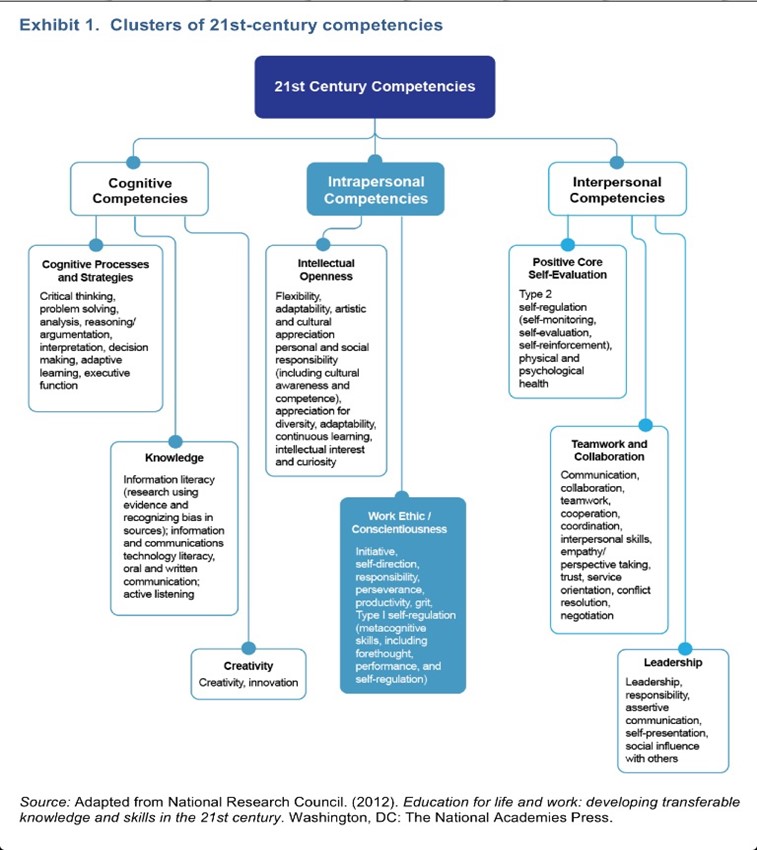
COMMON CORE: INDOCTRINATION FOR A NEW WORLD ORDER
aNITA b. hOGE [fREEDOM oUTPOST]
The newest push for global citizenship comes with new names from the Assess-ment and Teaching of 21st Century Skills (ATC21S) with global leaders including OECD, Intel, Cisco, and Microsoft, who are combining efforts for an international push for 21st Century Skills. In the book “Education For Life and Work: Developing Transferrable Knowledge and Skills in the 21st Century,” Pelligrino and Hilton, explain three domains of competence—cognitive, intrapersonal, and interpersonal, similar to Bloom, but expanding the interpersonal. (See Graph above) The cognitive domain involves reasoning and memory; the intrapersonal domain involves the capacity to manage one’s behavior and emotions to achieve one’s goals (Common Core and College and Career Ready Standards); and the interpersonal domain involves expressing ideas, and interpreting and responding to messages from others.

Be prepared to accept the new mumble-jumble of names that the indoctrinators will place in these new models. The concept of getting into the personality of students including value judgments like “higher order thinking, deeper thinking, and metacognition” continues the idea of teaching the “whole child” theory for acceptance and understanding the international merging for a new world order. Not much has changed from the 70′s. The apple never falls far from the tree.
Source: Adapted from National Research Council (2012. Education for life and work: developing transferable knowledge and skills in the 21st century, Washington, D.C. The National Academies Press.
A Current Behavior Changing Activity reported in April, 2013, which includes roll playing and presumes that the Germans were the victims during the holocaust.
From “Think like a Nazi,”:
This following activity was news worthy April 12, 2013 of a value changing technique: “Students in Albany High School English classes were asked this week as part of a persuasive writing assignment to make an abhorrent argument: “You must argue that Jews are evil, and use solid rationale from government propaganda to convince me of your loyalty to the Third Reich!”
Students were asked to watch and read Nazi propaganda, then pretend their teacher was a Nazi government official who needed to be convinced of their loyalty. In five paragraphs, they were required to prove that Jews were the source of Germany’s problems.”
New York is a state involved in the Innovation Lab Network along with West Virginia and 5 other states.
The following excerpt was taken from testimony of a clinical psychologist about the Common Core Standards:
“A Mental Health Professional’s Perspective on the Common Core“, By Dr. Gary Thompson, Director of Clinical Training and Community Advocacy Services
Early Life Child Psychology and Education Center, Inc., March 25, 2013:
Excerpt: Educational Testing
According to the U.S. Department of Education, CCSS will authorize the use of testing instruments that will measure the “attributes, dispositions, social skills, attitude’s and intra personal resources” of public school students under CCSS (USDOE Feb, 2013 Report). In a nutshell, CCSS simply states that it will develop highly effective assessments that measures….well….almost “everything.”
Below are issues regarding CCSS “testing” policies that have not been addressed by the Common Core to State’s Governors’, State Superintendents, State School Boards, local school district superintendents, local school boards, to parents of children in public school education:
Common Core does not address what types of tests will be utilized on our children.
Common Core does not address, specifically, exactly who is developing these tests.
Common Core does not address the fact that these tests have not yet been developed, and are not available for public consumption or private review by clinical psychology researchers and psychometric professionals.
Common Core does not address if the soon to be completed tests will be subjected to the same rigorous peer review process that ALL testing instruments are subjected to prior to being released to mental health professionals for their use in the private sector.
Common Core does not state which public school employees would be administering or interpreting these tests. There is a reason that School Psychologists cannot “practice” outside of their scope in school districts. As hard working and as wonderful as this group is, their training pales in comparison to the average local clinical psychologist.
Common Core does not address the well documented, peer-reviewed fact that both African American and Latino students, due to cultural issues, tend to have skewed testing results when cultural issues are not addressed prior to the initiation of such testing. This should probably be addressed if these results are going to be following a student “from cradle to high school graduation.”
Lastly, once these highly intimate, powerful, and most likely inaccurate testing results are completed, who EXACTLY will have access to all of this data?
Comment from this author: Although Dr. Thompson has explained the privacy invading techniques and asked about the who and why of the testing components to the Common Core Standards and testing, we need to address one step further, the next “therapy” that would be applied at school to change the student. This is the reason the collection of personal information is completely dangerous in the hands of government. The first step is the collection of information or data on the student which is a violation of privacy. The second step, remediation or therapy applied to the student in an individual education plan (IEP) or personal career pathway without the knowledge or consent of the parent, is a violation of freedom. The death of free will, individualism, and our concept of America as we know it.
Use the 5 Magic Questions developed by Anita Hoge to fight subjective and vague Common Core-College and Career Ready Standards.
1. How do you measure that standard?
For example: If a College and Career Standard states that “all children must have ethical judgment, honesty, or integrity,” what exactly is going to be measured? How do you measure a bias in a child? Must children be diagnosed? Will they be graded by observation or take a pencil-and-paper test? How will performance or behavior be assessed?
2. How is that objective scored, or what is the standard? What behavior is “appropriate” and to what degree?
For example, how much self-esteem is too much or not enough to graduate? Can government score the attitudes and values of its citizens in a pluralistic society?
3. Who decides what that standard will be?
The state has extended its mandated graduation requirement, or Common Core Standards, down to the individual child. This bypasses all local autonomy. What about locally elected school directors – will they become obsolete? Are we talking about a state or government diploma or certificate?
4. How will my child be remediated? What are you going to do to my children to change them from here-to-there in their attitudes, values, and dispositions in order to graduate? How do you remediate ethical judgment, decision making, interpersonal skills, environmental attitudes, adapting to change? What techniques will be used? What risks are involved? What justification does the state have to change my child’s attitudes?
5. What if parent and state disagree on the standard or how it is measured in the classroom? Who has the ultimate authority over the child … parents or the state? What about privacy? Can parents opt out of a graduation requirement mandated by the government?
*This is Part 3 in a series. Read Part 1 here. Read Part 2 here.
NOTES:
The Death of Free Will, Charlotte Iserbyt,
West Virginia 21st Century Skills aligned to legislation
Begins coding for distinct behaviors
http://apps.sos.wv.gov/adlaw/csr/readfile.aspx?DocId=23911&Format=PDF
Common core standards connected to data sets
Smart Inventory, Interests Inventory Grade 4
http://wveis.k12.wv.us/Teach21/CSO/Upload/LP2061WS2.doc?tsele1=4&tsele2=104&tsele3i=2061
College & Career Ready Standards Task Force
https://kyp20nxgla.wikispaces.com/file/view/Discussion+Outline+for+CCR+Task+Force-1+12+12.docx (Copy this to browser)
ACT21S, Assessment and Teaching of 21st Century Skills, a global team for transformation
Education For Life and Work, National Research Council, Pelligrino, Hilton, 2012
Promoting Moral Growth from Piaget to Kohlberg,” Hershey, Paolitto, Reimer 1979
SCANS, Secretaries Commission on Achieving Necessary Skills, US Department of Labor, 1992
Stupski workshop presentation, 6 states chosen for Innovation Lab Network,
‘Obama’s, Race to the Top Agenda’ – States Under Republican Leadership Fall For the Carrot: Children Sold-Out for a Profit, by Anita B. Hoge, March 18, 2013.

